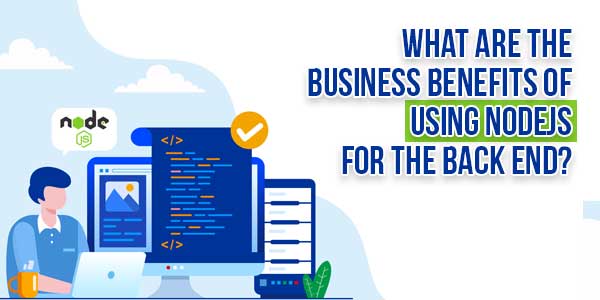
Since its inception, Node.js has been a great option for web development. Big businesses and startups continue to use Node.js for their production, which was built with scalability and performance in mind.
Node.js is effective and quick for developing apps and performing web development services because it uses an event-driven and non-blocking I/O architecture.
For business owners who are looking for ways to increase productivity and revenue, using Node.js for back-end development can be of great help. If you are considering to hire dedicated nodejs developers here are the ways in which your business can benefit from them:
Table of Contents
What Is NodeJS?
For building scalable server-side web apps as well as back-end APIs (Application Program Interfaces), NodeJS can be of great help. It is an event-driven JavaScript runtime, and it is also free software that operates in a “Single-Threaded” environment.
Client-server connection and data processing are quick with NodeJS. Developers can reuse node js web development for both the front-end and the back-end development.
How Business Can Benefit From Nodejs Back-End Development?
There are many ways in which businesses can benefit from NodeJS back-end development and its important benefits them are given here:
1.) High Performance For Real-Time Applications:
The web programs built with Node.js have multitasking capabilities. Unlike other platforms, it efficiently handles several requests without overloading RAM with its single-threaded, event-driven architecture.
The application’s total speed is significantly impacted by its event-loop and non-blocking I/O operations, which enables the code to be processed quickly. With faster execution, better compilers, security patchworks, and the ability to expand, Node.js ensures high performance for real-time applications.
2.) Easily Scalable:
As Node.js allows for load balancing over many CPU cores, it is simple to get desired outcomes with smaller modules without using up all of the RAM. Node.js also takes advantage of a non-blocking event-loop architecture that offers exceptional scalability and enables the server to respond to requests quickly.
3.) Offers Community Assistance:
The Node.js community has millions of active developers. So, one can expect significant assistance from development experts all around the world to solve even the most complex development.
The advantages of Node.js are further enhanced by the support of many major IT businesses that use Node.js for back-end development. With their contributions, many open-source solutions have been created.
4.) Cross-Functional Team Building:
Node.js offers full-stack development capabilities, and it helps to put together a team that is committed to enhancing the development life cycle and responding to issues rapidly. When you hire dedicated node js developers, they will effectively resolve and rectify issues with teamwork and will soon provide a positive solution.
5.) Increases App Response Time:
Node.js offers a non-blocking asynchronous architecture with its single-threaded event-loop paradigm while taking fewer resources and creating fewer threads. As it is able to support multiple users, Node.js back-end development is more responsive.

Most Suitable Candidates For Node.Js Back-End Development:
Businesses that need to create scalable, high-performance apps with heavy traffic on their websites should use Node.js as their back-end technology. These might include social media platforms, online stores, or any other kind of web service that needs continual maintenance and quick scaling when there is high traffic.
Small businesses can also profit from NodeJS back-end development. With these benefits, when you compare node js vs flask, Node.js always had the upper hand in back-end development.
Used Cases Of Node.Js Back-End Development
The most commonly used case scenarios of Node.js back-end development are:
- Media streaming applications: Node.js is suitable for handling media streaming due to its non-blocking I/O model. It can efficiently manage multiple connections and deliver content in real-time.
- Social media networks: Node.js can handle the real-time updates and notifications that are important for social media networks. Its event-driven nature allows for instant content updates, enabling users to get notifications.
- Online communities and forums: Forums and community platforms benefit from Node.js’s ability to handle multiple connections efficiently. Real-time interactions can be facilitated with enhanced user experience.
- Online sales portals and e-commerce sites: Node.js helps in the creation of fast and responsive e-commerce websites. Its lightweight nature and scalability make it suitable for handling a large number of users.
- Payment gateways: Security and real-time processing are essential for payment gateways. Node.js’s event-driven architecture allows developers to build secure payment processing systems that can handle a high volume of transactions.
- Customer support portals: Node.js’s real-time capabilities can improve customer support portals, and it enables instant interactions between users and support agents. It can also provide features like live chat, ticketing systems, and real-time problem resolution.
- Content management systems: Node.js can power content management systems that require real-time updates and collaboration features.
- Continuous integration: Node.js can be used to automate and manage continuous integration processes. It can assist in building, testing, and deploying code changes quickly and efficiently.
- Scalable web services: Node.js’s event-driven, non-blocking architecture makes it a great choice for building web services that need to handle a large number of simultaneous connections.
- Server monitoring: Node.js can be used to create monitoring systems that track server health, performance metrics, and other critical data in real time. Its lightweight nature ensures minimal resource consumption for monitoring tasks.
Commonly Used Technology Stacks While Using Node.Js Back-End Development:
The following technological stacks are most frequently used with Node.js as a back-end tool:
- js is a scalable Node.js framework with a simple core that provides the essential building blocks needed to create scalable server-side and networking applications.
- An express framework is a Node.js based lightweight web application framework that provides a basic framework for creating websites and APIs.
- Loopback is a NodeJS application platform that is built on Express and is incredibly scalable and mobile-ready.
- Mean Stack, which is a full-stack javascript solution.
Final Thoughts:
The simplicity and scalability of Node JS have made it one of the most widely used languages among developers in recent years. For websites and real-time communication systems, it is used to create scalable back-end applications.
So, look for node js developers for hire in hiring portals or any other means where you can hire developers. Always look for Node.js developers with enough experience and expertise.

 About the Author:
About the Author:












Be the first to write a comment.